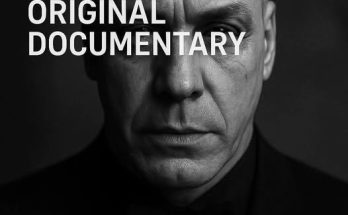Netflix has built its reputation on creating groundbreaking documentaries that capture the imagination of audiences across the globe, from true crime sagas that dominate social conversations to deeply personal artist profiles that give viewers a chance to connect with musicians and performers on a more human level. Now the streaming giant has unveiled the trailer for what is already shaping up to be one of its most highly anticipated music documentaries of the year: a film focusing on Till Lindemann, the enigmatic and often controversial frontman of the German industrial metal band Rammstein. The announcement has set both fans and critics buzzing, as the singer is one of the most polarizing figures in modern music, known equally for his theatrical stage persona, gravelly voice, and provocative artistry as he is for his deeply private and poetic side that few outside of his inner circle have ever glimpsed. This project represents a rare opportunity to peel back the layers on a man who has thrived on mystery while simultaneously standing in the spotlight for over three decades.
The trailer itself gives viewers a brief but powerful preview of what they can expect from the full documentary. Set against haunting instrumental backdrops and bursts of Rammstein’s signature industrial soundscapes, it teases intimate interviews, behind-the-scenes footage, and archival clips that chart Lindemann’s journey from his childhood in East Germany to his rise as one of the most recognizable frontmen in heavy music. One striking moment from the trailer shows Lindemann alone in a dimly lit studio, scribbling poetry into a notebook, a nod to his literary background that many casual fans may not even know exists. Another clip juxtaposes this quiet, reflective image with explosive shots of Rammstein’s legendary pyrotechnic performances, complete with flames shooting dozens of feet into the air and massive stadium crowds chanting his name. It is this duality—poet and provocateur, recluse and performer—that the documentary appears set to explore, offering viewers a deeper understanding of a man who has carefully cultivated his mythos while rarely explaining it.
For longtime Rammstein fans, the announcement carries a special weight because Lindemann has always represented more than just a vocalist. His baritone delivery and commanding stage presence are central to the band’s identity, but his work as a lyricist has also been vital in shaping their sound and image. Rammstein’s songs often blend dark humor, cultural critique, and unapologetic explorations of taboo subjects, and Lindemann’s ability to craft lyrics that are both provocative and poetic has made him a fascinating figure to study. While the band’s elaborate concerts and outlandish music videos have frequently drawn headlines, it is his words—delivered with a mix of menace and theatricality—that have left an indelible mark on fans. Netflix’s decision to focus specifically on him rather than the entire band reflects the recognition that Lindemann’s personal story is one worth telling on its own terms, independent of the collective narrative.
The documentary also arrives at a time when music documentaries have become a dominant cultural force in the streaming era. Projects like “Miss Americana” about Taylor Swift, “Homecoming” about Beyoncé, or the more experimental “Moonage Daydream” on David Bowie have shown how modern audiences crave deeper insights into the artists they admire. But Lindemann represents a unique case because his public image has been built less on accessibility and more on mystery. Whereas many musicians invite fans into their personal lives through social media or carefully curated documentaries, Lindemann has always maintained a distance, choosing instead to communicate through art, performance, and poetry. This gives the Netflix project a particular allure, as it promises to reveal elements of his personality and career that have remained hidden. The tension between what fans think they know and what they will actually learn is one of the reasons anticipation is so high.
Beyond the music, the trailer hints at explorations of Lindemann’s upbringing in the German Democratic Republic, a topic that could provide valuable cultural and historical context to his art. Growing up under a strict and surveilled system shaped many East German artists, and Lindemann’s worldview was inevitably influenced by this backdrop. His early experiences, including his time as a competitive swimmer before eventually turning to poetry and music, demonstrate the diverse layers of his life that extend far beyond the stage. Netflix seems poised to dig into these formative years to explain not only who Lindemann became but also why his work often grapples with themes of authority, rebellion, and human complexity. Fans who only know him as the fiery frontman in leather outfits amid flame-filled arenas may come away surprised at how much his East German upbringing influenced his artistic path.
Of course, no documentary about Lindemann would be complete without addressing the controversies that have followed him throughout his career. From provocative lyrics to shocking stage performances that deliberately flirt with themes of sexuality, violence, and taboo-breaking imagery, Rammstein—and Lindemann in particular—have never shied away from pushing boundaries. Critics have accused them of courting outrage for attention, while supporters argue that their art is a form of social commentary, deliberately forcing audiences to confront uncomfortable truths. The Netflix trailer does not shy away from these elements, with quick flashes of protests, headlines, and critics’ voices juxtaposed against fans celebrating their devotion to the band. This suggests that the documentary will tackle head-on the dual perception of Lindemann as both cultural provocateur and misunderstood artist, giving audiences the chance to form their own interpretations.
In addition to the music and controversies, the film is expected to highlight Lindemann’s work outside of Rammstein. Over the years he has released poetry collections, collaborated with artists across genres, and even embarked on solo musical ventures that showcase a different side of his creativity. These projects have often flown under the radar compared to the massive spectacle of Rammstein, but they provide important insight into his artistic identity. By shining a light on these endeavors, Netflix may help audiences see him as more than just the face of a band, but as a multifaceted artist with diverse passions and influences. This broader portrait could appeal not only to hardcore Rammstein fans but also to viewers who are interested in the psychology and motivations of creative individuals.
One of the key questions surrounding the documentary is how much access Lindemann has allowed the filmmakers into his private life. He has long been protective of his personal relationships and daily routines, rarely giving interviews or opening up about his offstage persona. The trailer suggests that he has at least granted some degree of intimate access, with scenes showing him in quieter, more vulnerable settings that contrast sharply with his larger-than-life stage image. Whether these moments represent a genuine unmasking or are simply another layer of performance remains to be seen, but either way they add intrigue to the project. The allure of seeing Lindemann, who is often associated with fire, leather, and booming crowds, in unguarded human moments is a strong draw for audiences who crave authenticity in their documentaries.
The impact of the documentary will likely extend beyond just Rammstein’s dedicated fanbase. In recent years, discussions around censorship, artistic freedom, and the role of provocation in art have become increasingly relevant, and Lindemann’s career serves as a perfect case study for these debates. His work raises questions about where the line between art and offense lies, and whether artists have a responsibility to their audiences or whether they should be free to challenge societal boundaries without compromise. By presenting his story in a long-form documentary format, Netflix is giving space for these conversations to unfold, potentially sparking debates among viewers about art, culture, and expression in the modern era. It is not just a film about a musician—it is also a film about what it means to be an artist in a world that constantly negotiates between freedom and restraint.
The trailer’s release has already caused a surge of excitement on social media, with fans posting their reactions and speculating about what the full documentary will reveal. Some are thrilled at the chance to see Lindemann in a more personal light, while others are wary of how much will actually be revealed, given his history of guarding his privacy. Still, the fact that Netflix is investing in such a project signals confidence that his story will resonate with global audiences. After all, Rammstein is one of the few non-English-speaking bands to achieve sustained mainstream success around the world, with massive tours in North America, Europe, and beyond. Lindemann’s story is therefore not just a German story, but a universal one about creativity, fame, and the struggle to maintain individuality in the face of immense public scrutiny.



